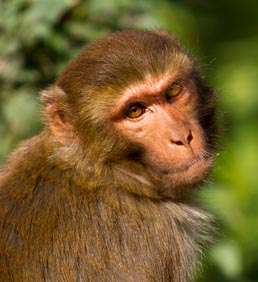Monkey business: Researchers discover primitive forms of wealth

(Phys.org) —Comparisons between the stock market floor and a zoo are not far from the mark, according to a new study published today in the journal Proceedings of the National Academy of Sciences (PNAS).
A team of researchers, including Dr Agnieszka Tymula from the University of Sydney's School of Economics, has found evidence of increased risk-taking amongst the 'wealthier' of our primate relatives, suggesting an evolutionary link to human sensitivities around affluence levels.
Dr Tymula says the findings indicate that monkey behaviour is very similar to humans' risk choices, and as a result can provide insight into the evolutionary roots of our behaviour.
"Human sensitivity to wealth levels developed before the advent of money," she says. "Understanding the biological mechanisms underlying risky behaviours that evolved around satiety may provide unique insights about decision-making and consumption wealth.
"We found that after training, monkeys are very rational. Just like humans, monkeys are able to select objectively better options from a menu of choices. If there is an alternative that offers better outcomes in all circumstances, they will go for it.
"The monkeys also seem to share human risk preferences. They were slightly risk averse and we know that humans would behave similarly in these experimental conditions."
The study, titled 'Thirst-dependent risk preferences in monkeys identify a primitive form of wealth', set out to discover whether monkeys share human risk attitudes and economic rationality, as well as how wealth alters risk-taking behaviours.
Using water intake among the monkeys as a non-pecuniary measure of wealth, researchers examined the level of water the rhesus macaques held internally to differentiate the 'rich' from the 'poor'.
After significant training over 20 days, the macaques were able to engage in visual gambling tasks, associating pie graphs showing various increments to the probability of fluid rewards. By shifting their gaze from left or the right, the monkeys made their choice between a safe option (of some amount of water for sure) and a risky option that offered a positive (most of the time higher) payoff or nothing, each with 50% chance. The amounts associated with the sure and risky options varied from trial to trial and were presented in a random order.
The 'richer' (more satiated) monkeys who possessed a higher blood osmolality were found to be less risk averse and take greater gambles than the 'poorer' less-hydrated subjects, who avoided uncertainty in their decision-making.
"It seems likely that the biological mechanisms that mediate changes in risk attitudes with wealth evolved around satiety mechanisms rather than around mortgages," the authors note in the publication.
Studies into how affluence impacts on human risk-tolerance have proven inconclusive due to difficulties in simulating varying financial conditions and a reliance on self-reporting amongst human subjects. Similarly, past research into risk attitudes and consumption-related wealth using other animals such as sparrows and starlings has presented inconsistent and contradictory results.
However, the new study reveals that monkeys are a good model for human decision-making, and highlights the potential questions that can be asked in a more controlled way with primate subjects, according to Dr Tymula.
"We would never have such control over water consumption among human populations; people often say one thing and do another."
More information: Thirst-dependent risk preferences in monkeys identify a primitive form of wealth, www.pnas.org/cgi/doi/10.1073/pnas.1308718110
Journal information: Proceedings of the National Academy of Sciences
Provided by University of Sydney



















